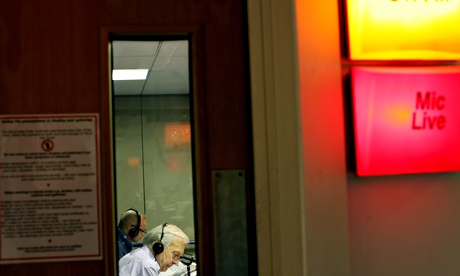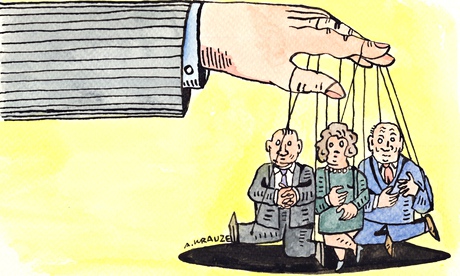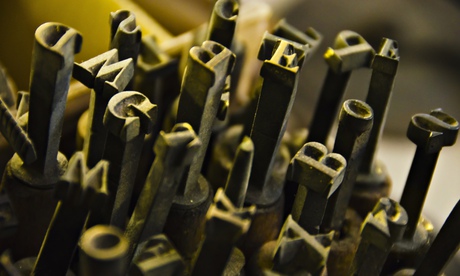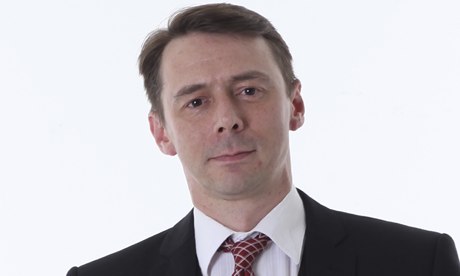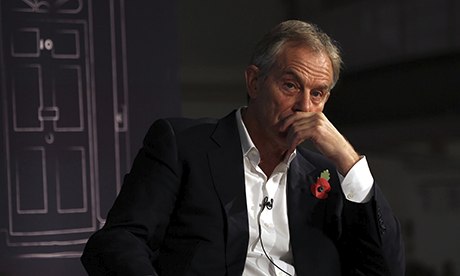Polly Toynbee in The Guardian
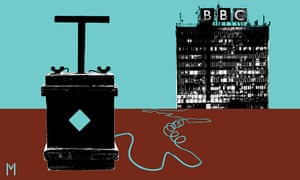
'The cuts are so severe that they risk sending the BBC into a downward spiral.' Illustration by Joe Magee
Groping for British emblems to bind together an ever more diverse and fissiparous society, politicians struggle to find cultural and emotional social glue. Make your own list from the Queen to Glastonbury, but overwhelmingly people put the NHS and the BBC right up there near the top, deep-dyed into British DNA.
But not this government. Whatever Conservatism once meant, it’s no longer about conserving precious things. The NHS staggers under the fragmenting Lansley act and the BBC is under more severe assault than ever before,threatened with licence fee cuts – and perilous charter renewal ahead. Is it payback time for Rupert Murdoch’s election support? According to BBC political editor Nick Robinson, Cameron on his battle-bus said of the BBC: “I’m going to close them down.” Joke or threat, it’s too close to what many in his party want to be laughed off. Many of the newer Tory MPs, Thatcher’s children, detest the very existence of the BBC – its phenomenal success an affront to market ideology.
Threats come thick and fast. John Whittingdale, newly promoted culture secretary, called the £145 licence fee “worse than the poll tax” in his former role as head of the culture select committee. Sajid Javid, the business secretary,complained this month that the licence fee was “a large amount for many families” and “needs looking at”. Other Tories shed crocodile tears for the poor who can’t afford the TV licence, calling for non-payment to be decriminalised – a compassion not shown to twice as many prosecuted for not paying council tax.
Decriminalisation would lose the BBC an estimated £200m a year – and that’s deliberate. The BBC may lose £600m if forced to carry the Department for Work and Pensions’ cost of exempting over-75s from the licence fee. And there’s a proposed five more static years to add to the current seven-year licence fee freeze.
The risk is that these become seen as “moderate” cuts, a “compromise” with the factions that want the BBC killed off. Yet they are so severe that they risk sending the BBC into a downward spiral, where fewer good programmes mean weakened public support, allowing yet more cuts. The loss of the Olympics to Eurosport from 2022, for an unaffordable £920m, is exactly what the BBC’s head of sport warned recently: as BBC income shrivels it can’t compete – and the licence fee looks less good value.
Barely a day goes by without the Mail, Telegraph and Rupert Murdoch’s papers attacking the BBC. This week’s Sunday Times had a full page of gleeful, barely veiled encouragement to the young not to pay their licence fee if they only watch catch-up TV on iPads or smartphones. It reported 150,000 more households in the past three months abandoned traditional TV and the licence fee, claiming not to watch it live. Everyone admits there’s a growing problem with attaching the licence fee to a TV set – but that’s easily fixed with a household fee or by bringing iPlayer under the licence.
Murdoch bullies ceaselessly for a subscription system, to shrink the BBC to the tiny size of America’s PBS. His paper’s poll shows apparent “waning” public support, with only 48% saying the licence fee is value for money, slightly more preferring funding by advertising. Left out was the inconvenient answer to one poll question which found only 9% want it funded by subscription. The BBC quotes 11 other polls showing that support for the licence fee at 42% is higher than for any other form of funding. What’s astonishing is that 96% of people use the BBC every week, spending an average of 18.5 hours watching, listening or online.
This week BBC Radio 4 launched its new season with a special celebration. With strong emphasis, its director general, Tony Hall, warned in a speech: “It’s something none of us should take for granted – there’s nothing else like it in the world.” He’s right, the station is the soundtrack to the nation, a never-ending conversation of remarkable intelligence and pleasure, reaching deep among Sun and Mirror readers, defying accusations that it’s a middle-class silo. By rights, this Reithian relic should have died out long ago: instead its listeners keep growing – up from 9 million a decade ago to 11 million now.
In the kitchen, in the car or out jogging with an iPod, I can’t imagine life without it. On a desert island, isn’t the entire back catalogue what you’d choose? The Now Show, More or Less, Neil Macgregor’s History of the World in a 100 Objects – only God and gardening have me reaching for the off button. Now here comes a whole day of poetry. Even the awfulness of the Archer family has me gripped.
Those 11 million Radio 4 adherents listen for an average of 12 hours a week – and each shining hour costs just 1.4p per listener. Nothing was ever such good value. The entire BBC has half the budget of Sky and a quarter of BT’s – which offer a fraction of the quantity or quality.
Choice busts out of every new provider – Amazon, Netflix and many more to come – yet the BBC, at £12 a month, dominates the British airwaves, while Sky charges an average £47.
The other line of attack will be on BBC governance – even though its every move is already over-policed by governors, trust and all the acronyms: Ofcom, NAO,PAC, DCLG, plus many parliamentary committees. From millions of BBC words, blunders and scandals are relatively few.
The BBC’s success infuriates its enemies because it defies Hayekian laws of gravity; the market ought to offer better value but it doesn’t. Attacks on BBC “bias” rain down: James Harding, head of BBC News, protested at the “hell on wheels” “ferocity” of attacks during the election – a little faux-naive, perhaps, from a former Murdoch editor who knows the agenda from the other side.
The BBC has a near impossible task in finding unbiased truths in an ideological world – and sometimes it splits the difference to stay on the safe side when forced to choose between sense and nonsense. The establishment leans heavily, the weight of an 85% Tory and europhobic press breathes hard to push it off its foothold. There is too often a blandifying of essential arguments when intimidation by bullies drains life out of reporting on the NHS, benefits, austerity or Europe.
Pinko bias is an illusion of the right – and voters gave Cameron his win. Before wielding axes, Tory MPs should think hard about constituents who spend 18.5 hours a week with the BBC – and of its place in national life as an unmatched cultural treasure.
Groping for British emblems to bind together an ever more diverse and fissiparous society, politicians struggle to find cultural and emotional social glue. Make your own list from the Queen to Glastonbury, but overwhelmingly people put the NHS and the BBC right up there near the top, deep-dyed into British DNA.
But not this government. Whatever Conservatism once meant, it’s no longer about conserving precious things. The NHS staggers under the fragmenting Lansley act and the BBC is under more severe assault than ever before,threatened with licence fee cuts – and perilous charter renewal ahead. Is it payback time for Rupert Murdoch’s election support? According to BBC political editor Nick Robinson, Cameron on his battle-bus said of the BBC: “I’m going to close them down.” Joke or threat, it’s too close to what many in his party want to be laughed off. Many of the newer Tory MPs, Thatcher’s children, detest the very existence of the BBC – its phenomenal success an affront to market ideology.
Threats come thick and fast. John Whittingdale, newly promoted culture secretary, called the £145 licence fee “worse than the poll tax” in his former role as head of the culture select committee. Sajid Javid, the business secretary,complained this month that the licence fee was “a large amount for many families” and “needs looking at”. Other Tories shed crocodile tears for the poor who can’t afford the TV licence, calling for non-payment to be decriminalised – a compassion not shown to twice as many prosecuted for not paying council tax.
Decriminalisation would lose the BBC an estimated £200m a year – and that’s deliberate. The BBC may lose £600m if forced to carry the Department for Work and Pensions’ cost of exempting over-75s from the licence fee. And there’s a proposed five more static years to add to the current seven-year licence fee freeze.
The risk is that these become seen as “moderate” cuts, a “compromise” with the factions that want the BBC killed off. Yet they are so severe that they risk sending the BBC into a downward spiral, where fewer good programmes mean weakened public support, allowing yet more cuts. The loss of the Olympics to Eurosport from 2022, for an unaffordable £920m, is exactly what the BBC’s head of sport warned recently: as BBC income shrivels it can’t compete – and the licence fee looks less good value.
Barely a day goes by without the Mail, Telegraph and Rupert Murdoch’s papers attacking the BBC. This week’s Sunday Times had a full page of gleeful, barely veiled encouragement to the young not to pay their licence fee if they only watch catch-up TV on iPads or smartphones. It reported 150,000 more households in the past three months abandoned traditional TV and the licence fee, claiming not to watch it live. Everyone admits there’s a growing problem with attaching the licence fee to a TV set – but that’s easily fixed with a household fee or by bringing iPlayer under the licence.
Murdoch bullies ceaselessly for a subscription system, to shrink the BBC to the tiny size of America’s PBS. His paper’s poll shows apparent “waning” public support, with only 48% saying the licence fee is value for money, slightly more preferring funding by advertising. Left out was the inconvenient answer to one poll question which found only 9% want it funded by subscription. The BBC quotes 11 other polls showing that support for the licence fee at 42% is higher than for any other form of funding. What’s astonishing is that 96% of people use the BBC every week, spending an average of 18.5 hours watching, listening or online.
This week BBC Radio 4 launched its new season with a special celebration. With strong emphasis, its director general, Tony Hall, warned in a speech: “It’s something none of us should take for granted – there’s nothing else like it in the world.” He’s right, the station is the soundtrack to the nation, a never-ending conversation of remarkable intelligence and pleasure, reaching deep among Sun and Mirror readers, defying accusations that it’s a middle-class silo. By rights, this Reithian relic should have died out long ago: instead its listeners keep growing – up from 9 million a decade ago to 11 million now.
In the kitchen, in the car or out jogging with an iPod, I can’t imagine life without it. On a desert island, isn’t the entire back catalogue what you’d choose? The Now Show, More or Less, Neil Macgregor’s History of the World in a 100 Objects – only God and gardening have me reaching for the off button. Now here comes a whole day of poetry. Even the awfulness of the Archer family has me gripped.
Those 11 million Radio 4 adherents listen for an average of 12 hours a week – and each shining hour costs just 1.4p per listener. Nothing was ever such good value. The entire BBC has half the budget of Sky and a quarter of BT’s – which offer a fraction of the quantity or quality.
Choice busts out of every new provider – Amazon, Netflix and many more to come – yet the BBC, at £12 a month, dominates the British airwaves, while Sky charges an average £47.
The other line of attack will be on BBC governance – even though its every move is already over-policed by governors, trust and all the acronyms: Ofcom, NAO,PAC, DCLG, plus many parliamentary committees. From millions of BBC words, blunders and scandals are relatively few.
The BBC’s success infuriates its enemies because it defies Hayekian laws of gravity; the market ought to offer better value but it doesn’t. Attacks on BBC “bias” rain down: James Harding, head of BBC News, protested at the “hell on wheels” “ferocity” of attacks during the election – a little faux-naive, perhaps, from a former Murdoch editor who knows the agenda from the other side.
The BBC has a near impossible task in finding unbiased truths in an ideological world – and sometimes it splits the difference to stay on the safe side when forced to choose between sense and nonsense. The establishment leans heavily, the weight of an 85% Tory and europhobic press breathes hard to push it off its foothold. There is too often a blandifying of essential arguments when intimidation by bullies drains life out of reporting on the NHS, benefits, austerity or Europe.
Pinko bias is an illusion of the right – and voters gave Cameron his win. Before wielding axes, Tory MPs should think hard about constituents who spend 18.5 hours a week with the BBC – and of its place in national life as an unmatched cultural treasure.

